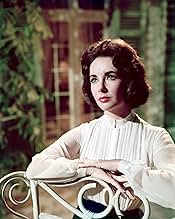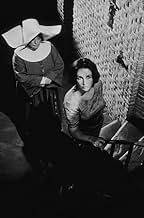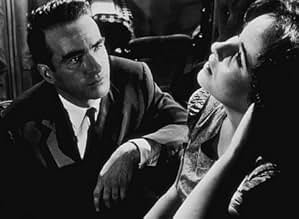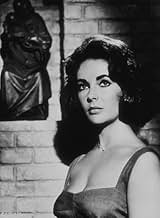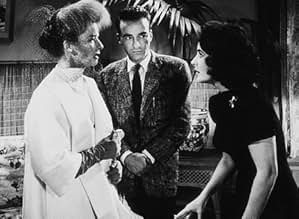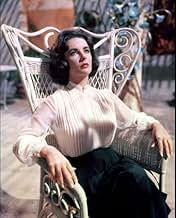Le fils unique de la riche veuve Violet Venable meurt alors qu'il est en vacances avec sa cousine Catherine. Ce que la jeune fille a vu était si horrible qu'elle en est devenue folle? à prés... Tout lireLe fils unique de la riche veuve Violet Venable meurt alors qu'il est en vacances avec sa cousine Catherine. Ce que la jeune fille a vu était si horrible qu'elle en est devenue folle? à présent, Mme Venable veut que Catherine soit lobotomisée pour découvrir la vérité.Le fils unique de la riche veuve Violet Venable meurt alors qu'il est en vacances avec sa cousine Catherine. Ce que la jeune fille a vu était si horrible qu'elle en est devenue folle? à présent, Mme Venable veut que Catherine soit lobotomisée pour découvrir la vérité.
- Réalisation
- Scénario
- Casting principal
- Nommé pour 3 Oscars
- 4 victoires et 7 nominations au total
- Dr. Hockstader's Secretary
- (as Sheila Robbins)
- Asylum Inmate
- (non crédité)
- Asylum patient
- (non crédité)
- Nurse
- (non crédité)
- Street Urchin
- (non crédité)
- Inmate
- (non crédité)
- Nurse
- (non crédité)
Avis à la une
Hepburn plays Mrs. Venable, whose son, Sebastian, died the previous summer of a heart attack. However, her niece Cathy, who accompanied Sebastian, has had a sort of breakdown and is institutionalized.
Mrs. Venable wants Cathy lobotomized. Before doing so, however, the gifted surgeon (Clift), sent there by his boss as Mrs. Venable dangles money for the hospital in front of him, becomes determined instead to find out what happened and how Sebastian really died.
This is a film that would never be made today - it's character-driven and has too much dialogue. It's a shame because the dialogue is excellent. A previous Mankiewicz film, "All About Eve," is word-rich as well, and there the dialogue sparkles. Here it is more poetic. And, like "Eve," the great roles are the womens.
Though references to homosexuality are only inferred, this film and the much more poorly adapted "Cat on a Hot Tin Roof" hold up very well today. With homosexuality much more discussed, the role this plays in both plots is very obvious, at least to this viewer.
In "Suddenly, Last Summer," Sebastian's proclivities are evident from the beginning as Mrs. Venable describes an almost husband-wife relationship with her son, claiming to the surgeon that Sebastian was "chaste" and that her relationship with him was enough for her son.
One of the comments here mentioned that "Cathy is crazy, like all Williams heroines." But in truth, Cathy like Blanche is disturbed (though Blanche may be a little closer to being nuts) and both are "put away" to shut them up - Blanche for her accusations against Stanley and Cathy because she knows how Sebastian really died.
Katharine Hepburn gives a brilliant performance as Mrs. Venable - charming but made of steel, her anger and jealousy toward her niece just barely beneath the surface.
Elizabeth Taylor gives one of her best performances under the strong direction of Mankiewicz. Taylor was blessed with great beauty but alas, not a great speaking voice. However, she is nevertheless very effective, particularly in her long, harrowing monologue near the end of the film.
Clift's passive portrayal of the surgeon is problematic, and one wonders why he was cast. The opening scene in which he performs an operation had to be redone many times because of his drunkenness and codeine addiction - he was washing down the pills with brandy; his voice quavers, he is unsteady on his feet, and his eyes are glassy.
He comes off a little better in the previous year's "Lonelyhearts," though in that film, he actually winces in pain when he has to sit. While Clift had the support of his fellow actors, he had none from Mankiewicz and producer Sam Spiegel.
Had it not been for Elizabeth Taylor's insistence, he would have been replaced. It seems cruel (as it did to Hepburn at the time) but Mankiewicz was trying to make a movie and Spiegel wanted it to be on budget - Clift's addictions and physical problems weren't helping. He couldn't remember lines; when he finally said them, he was often inaudible; and he was always late arriving on the set.
Fortunately for audiences, this wasn't his last big-budget role. Under the direction of Elia Kazan, he would do the magnificent "Wild River" and seemingly be more in control.
Despite this, "Suddenly, Last Summer" is an excellent, disturbing film, and is highly recommended. It's not Williams' best play, but it is served well in its film adaptation.
But this film version is actually extremely good. The cast more or less speaks for itself. Katherine Hepburn is not quite as repulsive as I imagine Mrs Venable to have become, but this is a movie version after all and somehow Katherine Hepburn seemed to become increasingly ghastly as the movie goes on - strong work on her part and the Director's part I shouldn't wonder. Taylor and Clift are predictably good.
Most Tennessee William's plays had their endings tampered with for Hollywood and this piece is no exception. However, there is only a subtle difference between the ending of the film and the ending of the play, unlike the cringe-inducing changes to some ("Streetcar" and "Cat" being the main offenders).
This is not William's best-known piece, but it is one of my favourites and this film version also slots in right up there with the very, very best.
Well worth seeing, is this.
Tennessee Williams was the toast of Broadway in the 1950's, with his melodramatic plays that often tackled heavy subjects such as addiction, adultery and in the case of this story, homosexuality. Katherine Hepburn plays a classic Tennessee Williams vamp, Violet Venable, a lady of means who is mourning the loss of her son. She has sought the help of a psychiatrist, played by Montgomery Clift, as she would like to have a lobotomy performed on her niece, who is apparently off her rocker (as most of Tennessee Williams' ladies are) and is spouting nasty rumors about the dead son.
Like most of Williams' work, Suddenly Last Summer flows along with over the top dialogue, the kind that actors love to sink their teeth into. I have not seen the original stage play but I suspect that this screenplay has been severely hacked to obliterate any talk of homosexuality. Venable's son was murdered while on vacation in Europe. If you take the dialogue literally you might believe that he was murdered for his religious convictions. If you read between the lines you will see that this was clearly a gay bashing.
Hepburn and Taylor both shine in their roles, that seem almost custom made for them. It's rare that Hepburn is cast as a villain, however, her performance leaves me wondering why she hasn't done it more often. Taylor's hyper-active hyper-ventilating, Catherine Holly works well here. Her own brand of melodramatic acting seems to compliment Williams' work.
Clift was a tad cardboard in his role as the psychiatrist, however, it is still interesting to watch this performance that was filmed after his face-altering car accident. One might think that he recently underwent a lobotomy. On the other hand, he is competent, and the performances of the actresses more than compensate.
Suddenly Last Summer works as a film, but I am hesitant to recommend to everyone. This is not an action flick, by any means, but rather a character piece. Scenes are long and they require your concentration, as important statements can be found between the lines. For fans of any of these actors, this is a must see!
This leaves MONTGOMERY CLIFT, as a surgeon who is asked to perform a lobotomy on Miss Taylor, hovering in the background and looking like a frightened sparrow most of the time, although it is he who uncovers the truth about last summer. Mr. Clift must have been at a difficult phase of his own personal life because he performs in a stiff, robot-like manner that makes him seem dubious as a skilled surgeon with steady hands.
All of this is highly melodramatic as only Tennessee Williams can muster, while at the same time affording us the luxury of watching two commanding performances from Hepburn and Taylor that were justifiably nominated for Oscars.
The tale seems burdened by too much heavy-handed poetry but somehow it holds the attention because of the forceful acting by a fine cast. Mercedes McCambridge is a standout as Taylor's mother in the sort of fluttery, birdbrain role one might suspect would be offered to Billie Burke if this had been filmed in the 1940s.
By the end of the film, Miss Hepburn is so far removed from reality that she thinks Dr. Sugar (Montgomery Clift) is her son Sebastian and seems more like a candidate for lobotomy than the plucky Miss Taylor. Taylor never quite has the air of vulnerability that the role demands, but she gives a colorful, if strident, performance as the poor victimized girl who was used as bait by her playboy cousin.
Le saviez-vous
- AnecdotesAccording to author Garson Kanin in his memoir "Tracy and Hepburn," Katharine Hepburn was reportedly so furious at the way Montgomery Clift was treated by producer Sam Spiegel and director Joseph L. Mankiewicz during filming that, after making sure that she would not be needed for retakes, she told both men off and actually spat at them (although it remains unclear just which one of the two she spat at, or if she spat at both).
- GaffesAlthough set in 1937, costumes, hairstyles and makeup worn by Dame Elizabeth Taylor are all contemporary in 1959.
- Citations
Catherine Holly: Is that what love is? Using people? And maybe that's what hate is - not being able to use people.
- ConnexionsEdited into Michael Jackson's This Is It (2009)
Meilleurs choix
Détails
- Date de sortie
- Pays d’origine
- Langue
- Aussi connu sous le nom de
- De repente en el verano
- Lieux de tournage
- Begur, Girona, Catalonia, Espagne(village and old castle scenes)
- Sociétés de production
- Voir plus de crédits d'entreprise sur IMDbPro
Box-office
- Budget
- 3 000 000 $US (estimé)
- Montant brut mondial
- 9 830 $US
- Durée
- 1h 54min(114 min)
- Couleur
- Rapport de forme
- 1.85 : 1



